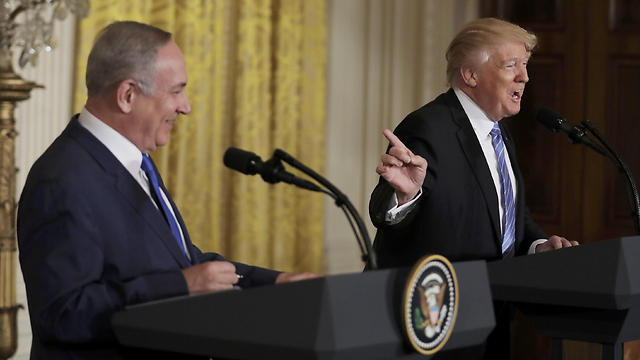
In Mideast peace efforts, Israel must deal its own cards
Op-ed: By initiating a two-state solution from a position of strength, Israel will be able to demand and receive something in return. If we leave it to Trump, he will deal the cards as he pleases, according to his own interests.
In an attempt to understand the deal that the US president is offering Israel and the Middle East, we must first of all distinguish between Donald Trump the businessman, who sees a deal as an agreement that benefits both the parties who sign it, and Trump of Las Vegas, who sees a deal as the cards dealt by the dealer to the players at a casino.
Trump the businessman, who is offering Prime Minister Benjamin Netanyahu a deal, is going to gain political “assets” in exchange for the concessions he will get Netanyahu to make. Trump the casino man is going to issue the Middle East players cards that will benefit the house, but not necessarily the players.

The right way, therefore, is to conduct the game and the negotiations for a deal ourselves, with our own cards and motivated by our interests and the Palestinians' interests, instead of the White House’s interests. A two-state solution initiated by Israel is, therefore, a proposal from a position of strength, for which Israel can demand and receive something in return. Accepting the exact same framework formulated by Trump would be capitulation from a position of weakness, for which we will not necessarily receive anything in return.
There is no way that Trump will allow a non-democratic state in Israel with Arabs who have no voting right. That is not a deal that the two parties can accept, and that is how he described the deal he is striving to achieve in his meeting with Netanyahu at the White House. We are headed, therefore, either toward a two-state solution or toward a rift with the United States, which will not be as polite and considerate as the rift with former US President Barack Obama. I have no doubt that Netanyahu understands that as well, and so the only possible reason for burying his head in the sand is that he would rather have Trump impose settlement evacuation on him than have to deal with Bayit Yehudi leader Naftali Bennett’s tongues of flame if he decides to do it himself.
We are back to a situation in which, when Netanyahu weighs the number of Knesset seats that will move from the Likud to Bayit Yehudi against the strategic consideration of the nature of the deal he could get for Israel, Bennett becomes the deciding factor due to Netanyahu’s concerns about how the right diplomatic move would affect the results of the election.
A recent survey conducted by the Tami Steinmetz Center for Peace Research at Tel Aviv University found that while 70 percent of Israel’s Jewish citizens favor the two-state solution over a one-state solution, 60 percent of them—including all the one-state supporter—believe that the two-state supporters are a minority. We, this 70-percent moderate majority, should wake up and act like a majority, instead of giving up on our ability to change as if we were a minority.
Mr. Prime Minister, if you muster the courage, you will have our vote. We are not out to get you. All we want is your wisdom to reach “the really great deal” Trump is talking about, at our own initiative, and reap the fruits of a regional agreement for our peace and economy, instead of leaving the earnings to the dealer from Washington, who is interested in cooperating with the moderate Arab Sunni world for his own good—not for ours. If we make sure to deal the cards ourselves, our chances of winning the game will grow. If we leave it to Trump, he will deal the cards as he pleases.
In a few weeks from now, we will mark the 50th anniversary of the Six-Day War. Let’s move from victory to solution, instead of settling for a move from victory to cessation.










